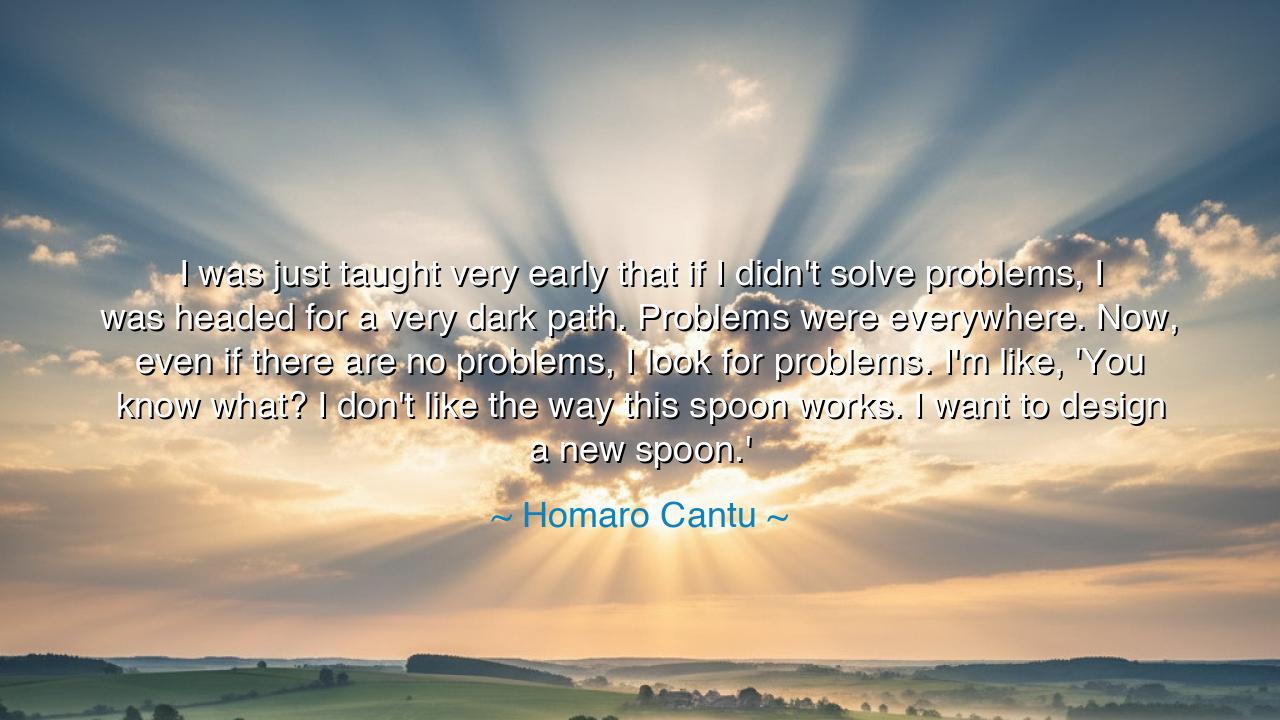
I was just taught very early that if I didn't solve problems, I
I was just taught very early that if I didn't solve problems, I was headed for a very dark path. Problems were everywhere. Now, even if there are no problems, I look for problems. I'm like, 'You know what? I don't like the way this spoon works. I want to design a new spoon.'






“I was just taught very early that if I didn’t solve problems, I was headed for a very dark path. Problems were everywhere. Now, even if there are no problems, I look for problems. I’m like, ‘You know what? I don’t like the way this spoon works. I want to design a new spoon.’” Thus spoke Homaro Cantu, the visionary chef and inventor whose hands reshaped the very idea of food. In these words, he reveals the essence of the creative spirit — the relentless drive to solve, to improve, to transform. His is not merely the voice of a cook, but of a philosopher of progress, one who sees in every flaw not frustration but opportunity. This is the creed of those who refuse to be conquered by circumstance: that creation is the antidote to despair.
Cantu’s life was one of both brilliance and struggle. Born into hardship, he grew up in a world where obstacles were his first teachers. From an early age, he learned that to do nothing was to perish — that to face a problem and master it was to carve a path out of darkness. Thus, when he says he was taught to solve problems or face a dark path, he speaks not metaphorically but from lived truth. Life had placed him before a fork in the road: to surrender, or to create. He chose creation — and in doing so, he discovered that invention is a form of salvation. For when the mind turns its pain into purpose, the heart finds light where once there was none.
To those who know his story, Homaro Cantu became not only a chef but a modern alchemist. He transformed kitchens into laboratories and meals into visions of what humanity could become. He once served edible menus and levitating desserts, turning the act of eating into a journey of wonder. Yet behind every playful dish lay a deeper mission — to solve hunger, to end waste, to reimagine how food could sustain not just the body, but the planet. He was driven by the same impulse he speaks of in this quote: the desire to improve the ordinary, even when it seemed already sufficient. “I don’t like the way this spoon works,” he said — and in that simple jest lies the truth of innovation itself. For progress is born not of comfort, but of dissatisfaction.
This spirit of restless invention has always guided humanity’s ascent. Consider Leonardo da Vinci, whose sketches filled pages with flying machines centuries before flight was possible. To him, the world was not fixed — it was a puzzle waiting to be solved. Where others saw walls, he saw windows. Where others saw impossibility, he saw design. Like Cantu, Leonardo’s genius was not in his knowledge alone, but in his refusal to accept that perfection had already been reached. The world advances not by those content with the spoon as it is, but by those who ask, “How might this spoon be better?”
But the wisdom of Cantu’s words extends beyond invention. It speaks also of discipline and purpose. To look for problems, even when none are apparent, is to remain alive to the world — awake, aware, and curious. The moment one ceases to seek improvement, one begins to decay. This was known to the ancients who tended their crafts as sacred duties. The blacksmith sharpened his blade not because it was dull, but because it could be sharper. The philosopher questioned truth not because it was false, but because it could be deeper. In this constant refinement lies the essence of human progress and personal mastery.
Yet there is also a warning hidden in Cantu’s reflection — that this hunger must be guided by purpose, not pride. For the same fire that creates can also consume. The pursuit of perfection, if divorced from compassion, becomes tyranny over the self. Cantu himself, a man of boundless vision, was at times overwhelmed by the very brilliance he carried. His story reminds us that while creation brings light, it must be balanced by rest, humility, and love. To solve the world’s problems, one must not lose sight of the human heart.
So let this teaching be carried forward: never cease to question, to build, to create. When you see something that does not work — in your home, in your community, in your world — take it as a summons, not a complaint. Whether you craft a better tool, a kinder word, or a wiser way of living, know that every act of improvement is an act of defiance against the darkness. Like Homaro Cantu, look upon even the smallest thing — a spoon, a system, a sorrow — and ask how it might be transformed.
For in this endless act of seeking, we fulfill the greatest duty of humankind: to leave the world better than we found it. And when there are no problems before you, as Cantu teaches, look for them — not because the world is broken, but because it is unfinished. The creator’s heart knows that perfection is not a place we reach, but a horizon we pursue forever.






AAdministratorAdministrator
Welcome, honored guests. Please leave a comment, we will respond soon